
试卷代号:2155 中央广播电视大学2009一2010学年度第二学期“开放专科”期末考试 英语阅读(1)试题 2010年7月 注意事项 一、将你的学号、姓名及分校(工作站)名称填写在答题纸的规定栏 内。考试结束后,把试卷和答题纸放在桌上。试卷和答题纸均不得带 出考场。 二、仔细阅读每题的说明,并按题目要求答题。答案必须写在答题 纸的指定位置上,写在试卷上无效。 三、用蓝、黑圆珠笔或钢笔答题,使用铅笔答题无效。 921
试卷代号 中央广播电视大学 2010 年度第 学期 放专 期未 英语阅读 2010 年7 注意事项 一、将你的学号、姓名及分校(工作站)名称填写在答题纸的规定栏 内。考试结束后,把试卷和答题纸放在桌上。试卷和答题纸均不得带 出考场。 二、仔细阅读每题的说明,并按题目要求答题。答案必须写在答题 纸的指定位置上,写在试卷上无效。 三、用蓝、黑圆珠笔或钢笔答题,使用铅笔答题无效。 921
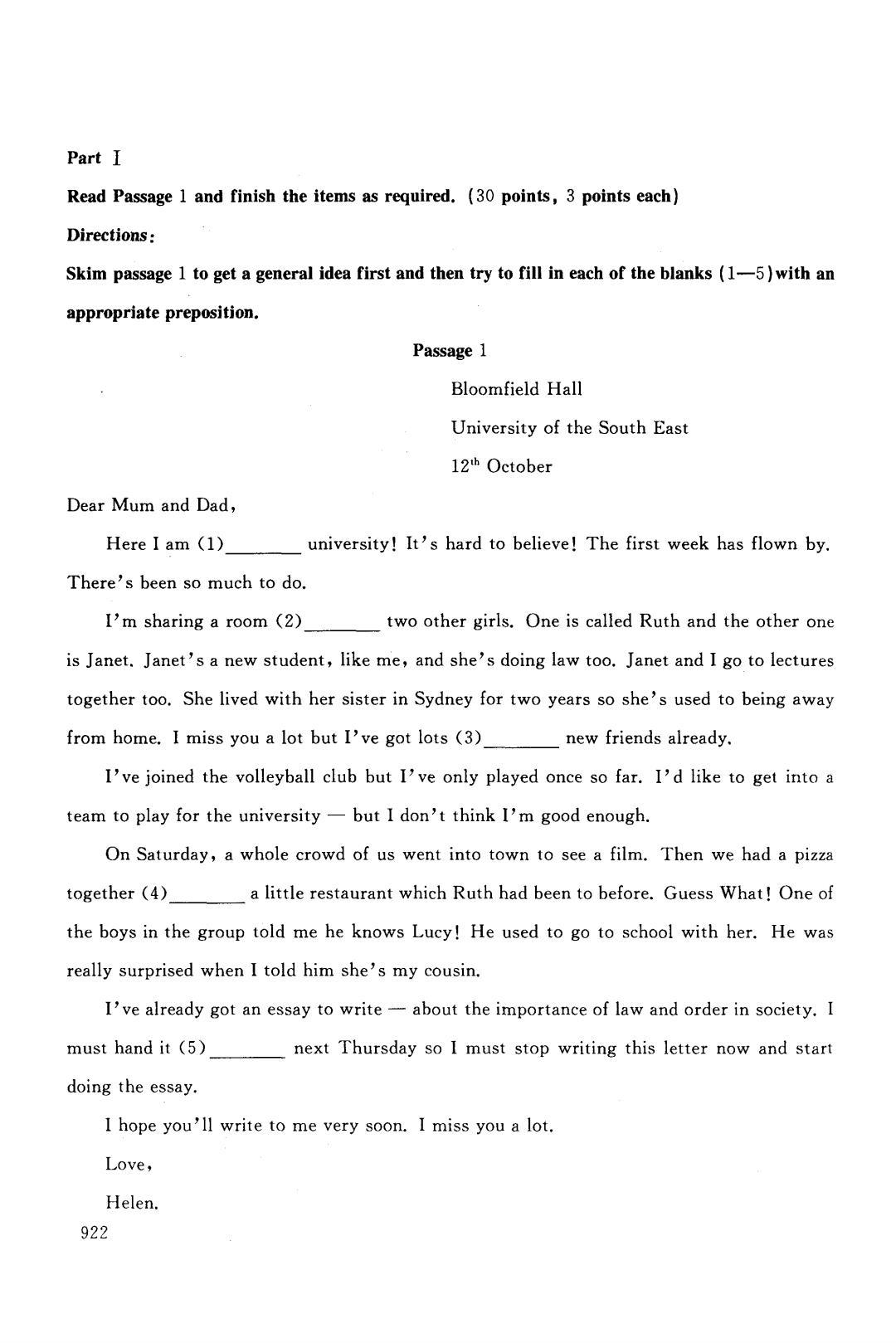
Part I Read Passage 1 and finish the items as required.(30 points,3 points each) Directions: Skim passage 1 to get a general idea first and then try to fill in each of the blanks (1-5)with an appropriate preposition. Passage 1 Bloomfield Hall University of the South East 12th October Dear Mum and Dad, Here I am (1) university!It's hard to believe!The first week has flown by. There's been so much to do. I'm sharing a room (2) two other girls.One is called Ruth and the other one is Janet.Janet's a new student,like me,and she's doing law too.Janet and I go to lectures together too.She lived with her sister in Sydney for two years so she's used to being away from home.I miss you a lot but I've got lots (3) new friends already. I've joined the volleyball club but I've only played once so far.I'd like to get into a team to play for the university-but I don't think I'm good enough. On Saturday,a whole crowd of us went into town to see a film.Then we had a pizza together (4)a little restaurant which Ruth had been to before.Guess What!One of the boys in the group told me he knows Lucy!He used to go to school with her.He was really surprised when I told him she's my cousin. I've already got an essay to write-about the importance of law and order in society.I must hand it (5)next Thursday so I must stop writing this letter now and start doing the essay. I hope you'll write to me very soon.I miss you a lot. Love, Helen. 922
Part I Read Passage 1 and finish the items as required. (30 points. 3 points each) Directions Skim passage 1 to get a general idea first and then try to fill in each of the blanks (1-5) with an appropriate prepωition. Eagd 'b e QUOu ze1JMyk Eor a1 nuLH amm Dear Mum and Dad , Here I am (1)一一一__university! It's hard to believe! The first week has flown by. There's been so much to do. I'm sharing a room (2) 一一 two other girls. One is called Ruth and the other one is Janet. Janet's a new student , like me , and she's doing law too. Janet and I go to lectures together too. She lived with her sister in Sydney for two years so she' s used to being away from home. I miss you a lot but I've got lots (3) new friends already. I' ve joined the volleyball club but I' ve only played once so far. I' d like to get into a team to play for the university - but I don' t think I' m good enough. On Saturday , a whole crowd of us went into town to see a film. Then we had a pizza together (4) a little restaurant which Ruth had been to before. Guess What! One of the boys in the group told me he knows Lucy! He used to go to school with her. He was really surprised when I told him she's my cousin. I' ve already got an essay to write - about the importance of law and order in society. I must hand it (5) next Thursday so I must stop writing this letter now and start doing the essay. I hope you' 11 write to me very soon. I miss you a lot. Love , Helen. 922
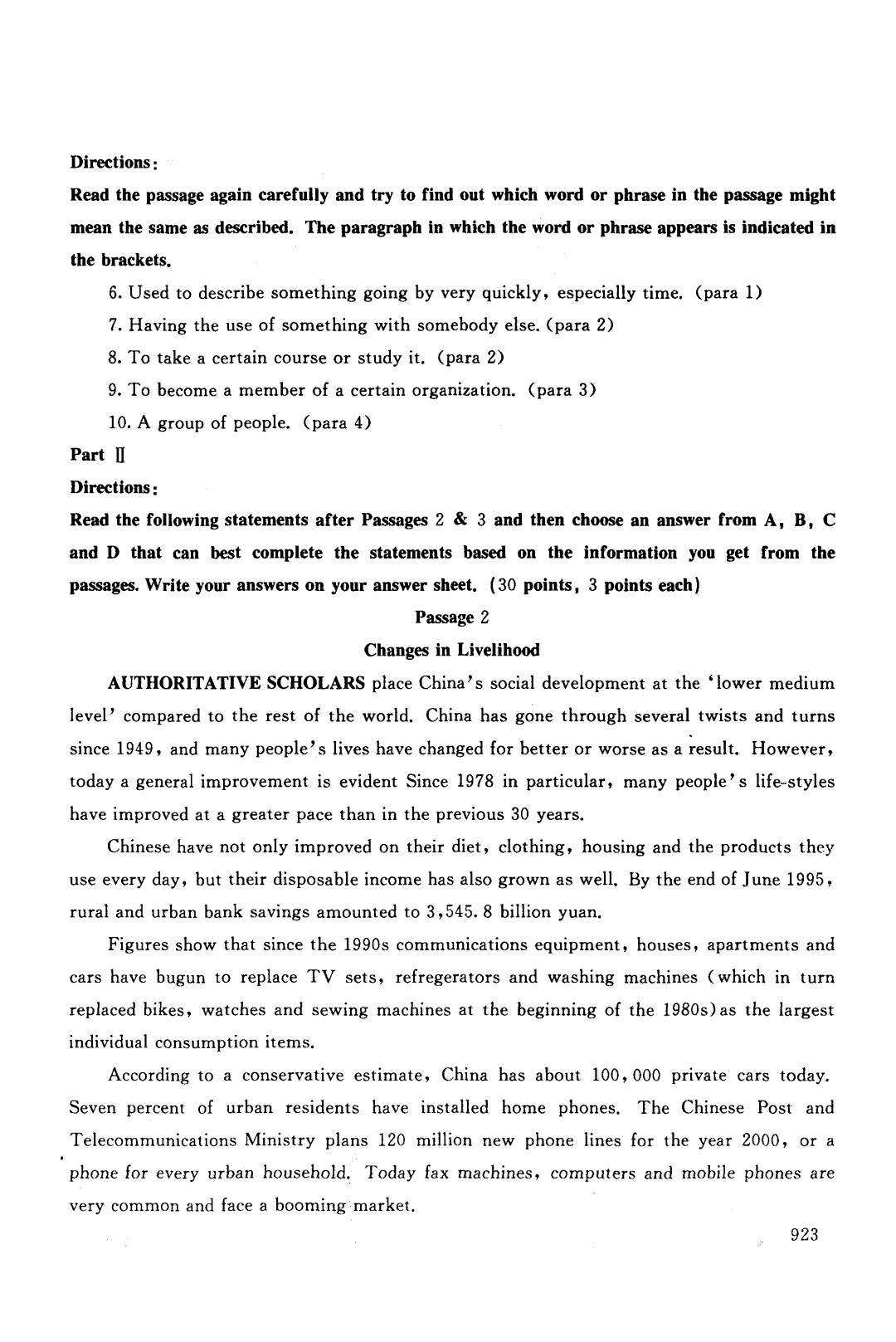
Directions: Read the passage again carefully and try to find out which word or phrase in the passage might mean the same as described.The paragraph in which the word or phrase appears is indicated in the brackets. 6.Used to describe something going by very quickly,especially time.(para 1) 7.Having the use of something with somebody else.(para 2) 8.To take a certain course or study it.(para 2) 9.To become a member of a certain organization.(para 3) 10.A group of people.(para 4) Part II Directions: Read the following statements after Passages 2 3 and then choose an answer from A,B,C and D that can best complete the statements based on the information you get from the passages.Write your answers on your answer sheet.(30 points,3 points each) Passage 2 Changes in Livelihood AUTHORITATIVE SCHOLARS place China's social development at the 'lower medium level'compared to the rest of the world.China has gone through several twists and turns since 1949,and many people's lives have changed for better or worse as a result.However, today a general improvement is evident Since 1978 in particular,many people's life-styles have improved at a greater pace than in the previous 30 years. Chinese have not only improved on their diet,clothing,housing and the products they use every day,but their disposable income has also grown as well.By the end of June 1995, rural and urban bank savings amounted to 3,545.8 billion yuan. Figures show that since the 1990s communications equipment,houses,apartments and cars have bugun to replace TV sets,refregerators and washing machines (which in turn replaced bikes,watches and sewing machines at the beginning of the 1980s)as the largest individual consumption items. According to a conservative estimate,China has about 100,000 private cars today. Seven percent of urban residents have installed home phones.The Chinese Post and Telecommunications Ministry plans 120 million new phone lines for the year 2000,or a phone for every urban household.Today fax machines,computers and mobile phones are very common and face a booming market. 923
Directions Read the passage again carefully and try to find out which word or phrase in the passage might mean the same 副described. The paragraph in which the word or phrase appears is indicated in the brackets. 6. Used to describe something going by very quickly , especially time. (para 1) 7. Having the use of something with somebody else. (para 2) 8. To take a certain course or study it. (para 2) 9. To become a member of a certain organization. (para 3) 10. A group of people. (para 4) Part II Directions Read the following statements after Passages 2 & 3 and then choose an answer from A. B. C and D that can best complete the statements based on the information you get from the passag Write your answers on your answer sheet. (30 points. 3 points each) Passage 2 Changes in Livelihood AUTHORITATIVE SCHOLARS place China's social development at the ‘ lower medium level' compared to the rest of the world. China has gone through several twists and turns since 1949 , and many people's lives have changed for better or worse as a result. However, todaya general improvement is evident Since 1978 in particular. many people' slife-styles have improved at a greater pace than in the previous 30 years. Chinese have not only improved on their diet , clothing , housing and the products they use every day , but their disposable income has also grown as welL By the end of June 1995 , rural and urban bank savings amounted to 3 ,545.8 billion yuan. Figures show that since the 1990s communications equipment , houses, apartments and cars have bugun to replace TV sets, refregerators and washing machines (which in turn replaced bikes, watches and sewing machines at the beginning of the 1980s) as the largest individual consumption items. According to a conservative estimate , China has about 100 ,000 private cars today. Seven percent of urban residents have installed home phones. The Chinese Post and Telecommunications Ministry plans 120 million new phone lines for the year 2000 , or a phone for every urban household. Today fax machines, computers and mobile phones are very common and face a boomingmarket. 923
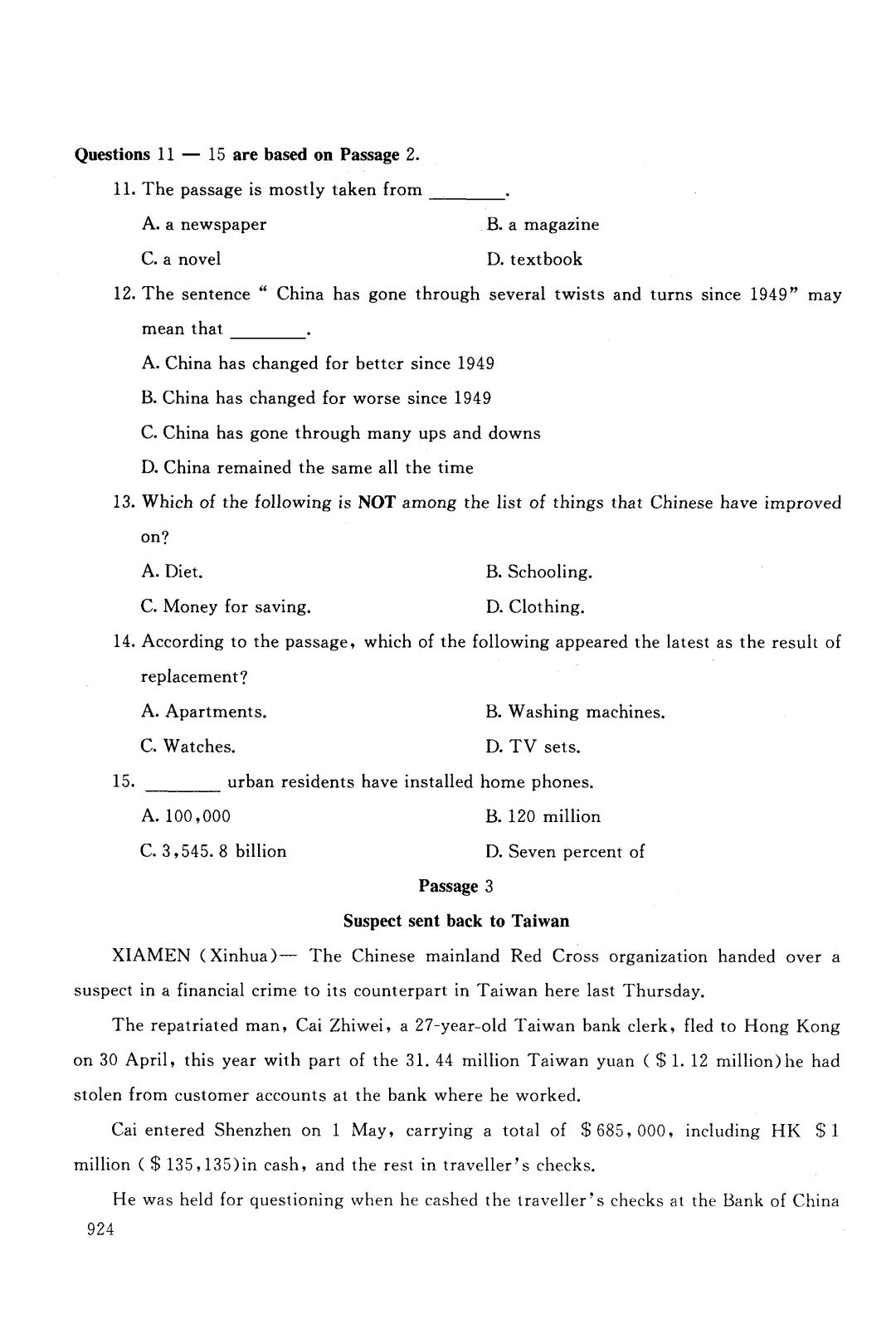
Questions 11-15 are based on Passage 2. 11.The passage is mostly taken from A.a newspaper B.a magazine C.a novel D.textbook 12.The sentence "China has gone through several twists and turns since 1949"may mean that A.China has changed for better since 1949 B.China has changed for worse since 1949 C.China has gone through many ups and downs D.China remained the same all the time 13.Which of the following is NOT among the list of things that Chinese have improved on? A.Diet. B.Schooling. C.Money for saving. D.Clothing. 14.According to the passage,which of the following appeared the latest as the result of replacement? A.Apartments. B.Washing machines. C.Watches. D.TV sets. 15. urban residents have installed home phones. A.100,000 B.120 million C.3,545.8 billion D.Seven percent of Passage 3 Suspect sent back to Taiwan XIAMEN (Xinhua)-The Chinese mainland Red Cross organization handed over a suspect in a financial crime to its counterpart in Taiwan here last Thursday. The repatriated man,Cai Zhiwei,a 27-year-old Taiwan bank clerk,fled to Hong Kong on 30 April,this year with part of the 31.44 million Taiwan yuan ($1.12 million)he had stolen from customer accounts at the bank where he worked. Cai entered Shenzhen on 1 May,carrying a total of 685,000,including HK $1 million (135,135)in cash,and the rest in traveller's checks. He was held for questioning when he cashed the traveller's checks at the Bank of China 924
Questions 11 - 15 are based on Passage 2. 11. The passage is mostly taken from A. a newspaper C. a novel • B. a magazine D. textbook • 12. The sentence" China has gone through several twists and turns since 1949" may mean that A. China has changed for better since 1949 B. China has changed for worse since 1949 C. China has gone through many ups and downs D. China remained the same all the time 13. Which of the following is NOT among the list of things that Chinese have improved on? A. Diet. C. Money for saving. B. Schooling. D. Clothing. 14. According to the passage , which of the following appeared the latest as the result of replacement? A. Apartments. C. Watches. B. Washing machines. D. TV sets. 15. urban residents have installed home phones. A.I00 ,000 C. 3 ,545. 8 billion B. 120 million D. Seven percent of Passage 3 Suspect sent back to Taiwan XIAMEN (Xinhua)- The Chinese mainland Red Cross organization handed over a suspect in a financial crime to its counterpart in Taiwan here last Thursday. The repatriated man , Cai Zhiwei , a 27-year-old Taiwan bank clerk , fled to Hong Kong on 30 April , this year with part of the 31. 44 million Taiwan yuan ( $ 1. 12 million) he had stolen from customer accounts at the bank where he worked. Cai entered Shenzhen on 1 May , carrying a total of $ 685 , 000 , including HK $ 1 million ( $ 135 ,135)in cash , and the rest in traveller' s checks. He was held for questioning when he cashed the traveller's checks at the Bank of China 924
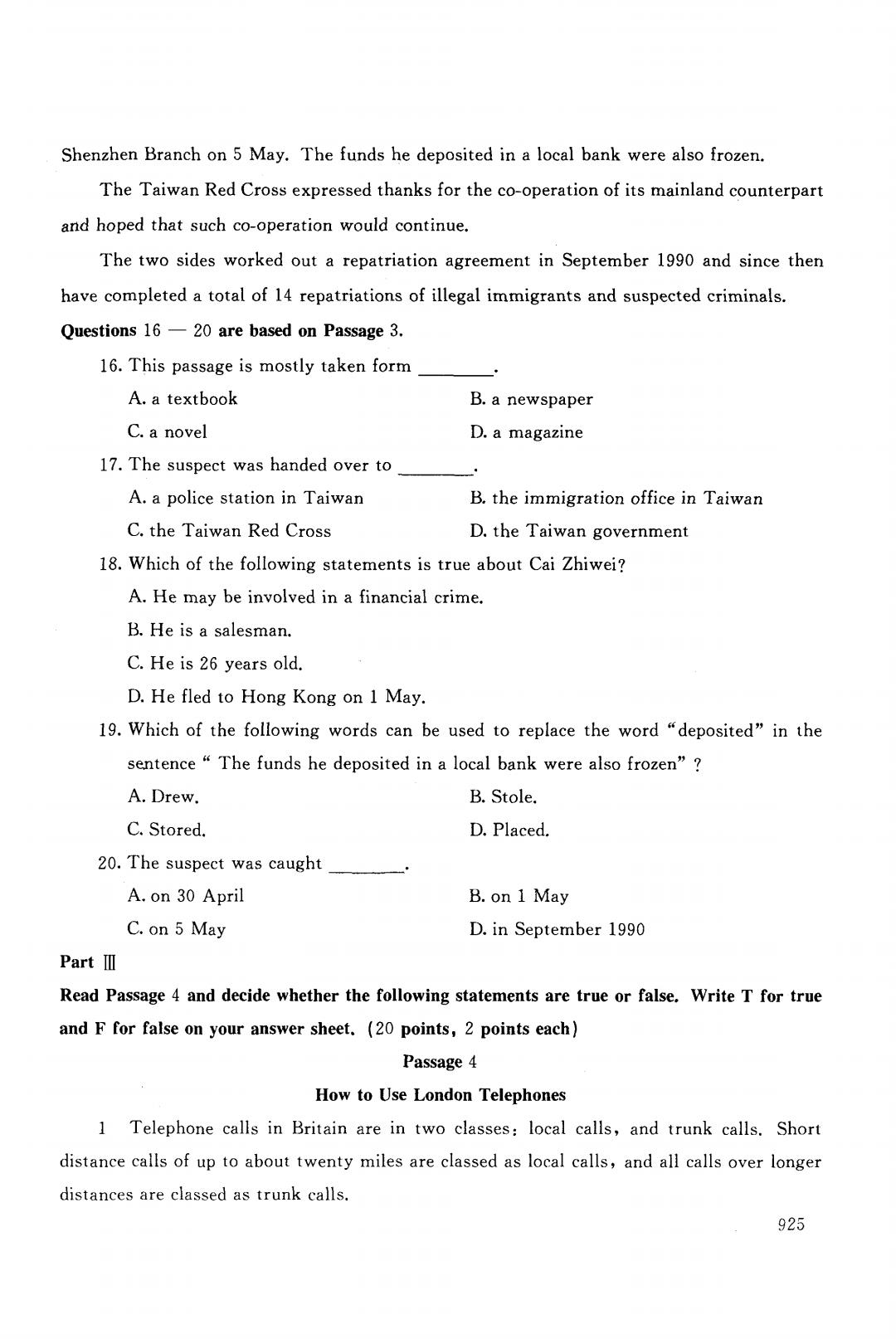
Shenzhen Branch on 5 May.The funds he deposited in a local bank were also frozen. The Taiwan Red Cross expressed thanks for the co-operation of its mainland counterpart and hoped that such co-operation would continue. The two sides worked out a repatriation agreement in September 1990 and since then have completed a total of 14 repatriations of illegal immigrants and suspected criminals. Questions 16-20 are based on Passage 3. 16.This passage is mostly taken form A.a textbook B.a newspaper C.a novel D.a magazine 17.The suspect was handed over to A.a police station in Taiwan B.the immigration office in Taiwan C.the Taiwan Red Cross D.the Taiwan government 18.Which of the following statements is true about Cai Zhiwei? A.He may be involved in a financial crime. B.He is a salesman. C.He is 26 years old. D.He fled to Hong Kong on 1 May. 19.Which of the following words can be used to replace the word "deposited"in the sentence“The funds he deposited in a local bank were also frozen”? A.Drew. B.Stole. C.Stored. D.Placed. 20.The suspect was caught A.on 30 April B.on 1 May C.on 5 May D.in September 1990 PartⅢ Read Passage 4 and decide whether the following statements are true or false.Write T for true and F for false on your answer sheet.(20 points,2 points each) Passage 4 How to Use London Telephones 1 Telephone calls in Britain are in two classes:local calls,and trunk calls.Short distance calls of up to about twenty miles are classed as local calls,and all calls over longer distances are classed as trunk calls. 925
Shenzhen Branch on 5 May. The funds he deposited in a local bank were also frozen. The Taiwan Red Cross expressed thanks for the co-operation of its mainland counterpart and hoped that such co-operation would continue. The two sides worked out a repatriation agreement in September 1990 and since then have completed a total of 14 repatriations of illegal immigrants and suspected criminals. Questions 16 - 20 are based on Passage 3. 16. This passage is mostly taken form A. a textbook B. a newspaper C. a novel D. a magazine 17. The suspect was handed over to A. a police station in Taiwan B. the immigration office in Taiwan C. the Taiwan Red Cross D. the Taiwan government 18. Which of the following statements is true about Cai Zhiwei? A. He may be involved in a financial crime. B. He is a salesman. C. He is 26 years old. D.H巳fled to Hong Kong on 1 May. 19. Which of the following words can be used to replace the word "deposited" in the sentence" The funds he deposited in a local bank were also frozen" ? A. Drew. B. Stole. C. Stored. D. Placed. 20. The suspect was caught A. on 30 April C. on 5 May ny nu er aeym e BD:·l -iQU Part III Read Passage 4 and decide whether the following statements are true or false. Write T for true and F for false on your answer sheet. (20 points, 2 points each) Passage 4 How to Use London Telephones 1 Telephone calls in Britain are in two classes: local calls, and trunk calls. Short distance calls of up to about twenty miles are classed as local calls, and all calls over longer distances are classed as trunk calls. 925
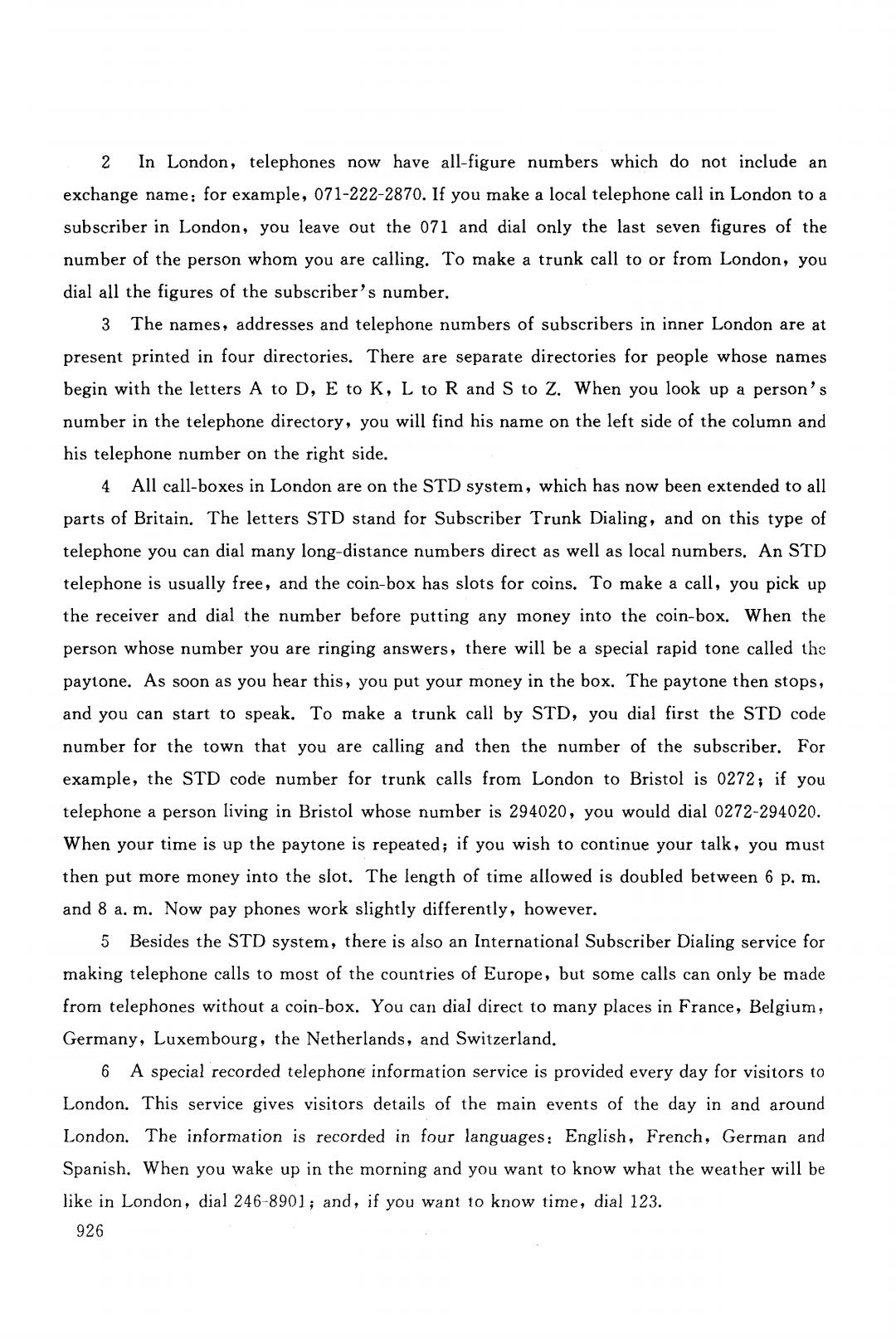
2 In London,telephones now have all-figure numbers which do not include an exchange name:for example,071-222-2870.If you make a local telephone call in London to a subscriber in London,you leave out the 071 and dial only the last seven figures of the number of the person whom you are calling.To make a trunk call to or from London,you dial all the figures of the subscriber's number. 3 The names,addresses and telephone numbers of subscribers in inner London are at present printed in four directories.There are separate directories for people whose names begin with the letters A to D,E to K,L to R and S to Z.When you look up a person's number in the telephone directory,you will find his name on the left side of the column and his telephone number on the right side. 4 All call-boxes in London are on the STD system,which has now been extended to all parts of Britain.The letters STD stand for Subscriber Trunk Dialing,and on this type of telephone you can dial many long-distance numbers direct as well as local numbers.An STD telephone is usually free,and the coin-box has slots for coins.To make a call,you pick up the receiver and dial the number before putting any money into the coin-box.When the person whose number you are ringing answers,there will be a special rapid tone called the paytone.As soon as you hear this,you put your money in the box.The paytone then stops, and you can start to speak.To make a trunk call by STD,you dial first the STD code number for the town that you are calling and then the number of the subscriber.For example,the STD code number for trunk calls from London to Bristol is 0272;if you telephone a person living in Bristol whose number is 294020,you would dial 0272-294020. When your time is up the paytone is repeated;if you wish to continue your talk,you must then put more money into the slot.The length of time allowed is doubled between 6 p.m. and 8 a.m.Now pay phones work slightly differently,however. 5 Besides the STD system,there is also an International Subscriber Dialing service for making telephone calls to most of the countries of Europe,but some calls can only be made from telephones without a coin-box.You can dial direct to many places in France,Belgium, Germany,Luxembourg,the Netherlands,and Switzerland. 6 A special recorded telephone information service is provided every day for visitors to London.This service gives visitors details of the main events of the day in and around London.The information is recorded in four languages:English,French,German and Spanish.When you wake up in the morning and you want to know what the weather will be like in London,dial 246-8901;and,if you want to know time,dial 123. 926
2 In London , telephones now have all-figure numbers which do not include an exchange name: for example , 071-222-2870. If you make a local telephone call in London to a subscriber in London , you leave out the 071 and dial only the last seven figures of the number of the person whom you are calling. To make a trunk call to or from London , you dial all the figures of the subscriber's number. 3 The names, addresses and telephone numbers of subscribers in inner London are at present printed in four directories. There are separate directories for people whose names begin with the letters A to D, E to K , L to Rand S to Z. When you look up a person' s number in the telephone directory , you will find his name on the left side of the column and his telephone number on the right side. 4 All call-boxes in London are on the STD system , which has now been extended to all parts of Britain. The letters STD stand for Subscriber Trunk Dialing , and on this type of telephone you can dial many long-distance numbers direct as well as local numbers. An STD telephone is usually free , and the coin-box has slots for coins. To make a call , you pick up the receiver and dial the number before putting any money into the coin-box. When the person whose number you are ringing answers, there will be a special rapid tone called the paytone. As soon as you hear this, you put your money in the box. The paytone then stops, and you can start to speak. To make a trunk call by STD, you dial first the STD code number for the town that you are calling and then the number of the subscriber. For example , the STD code number for trunk calls from London to Bristol is 0272; if you telephone a person living in Bristol whose number is 294020 , you would dial 0272-294020. When your time is up the paytone is repeated; if you wish to continue your talk , you must then put more money into the slot. The length of time allowed is doubled between 6 p. m. and 8 a. m. Now pay phones work slightly differently , however. 5 Besides the STD system, there is also an International Subscriber Dialing service for making telephone calls to most of the countries of Europe , but some calls can only be made from telephones without a coin-box. You can dial direct to many places in France , Belgium. Germany , Luxembourg , the Netherlands, and Switzerland. 6 A special recorded telephone information service is provided every day for visitors to London. This service gives visitors details of the main events of the day in and around London. The inf
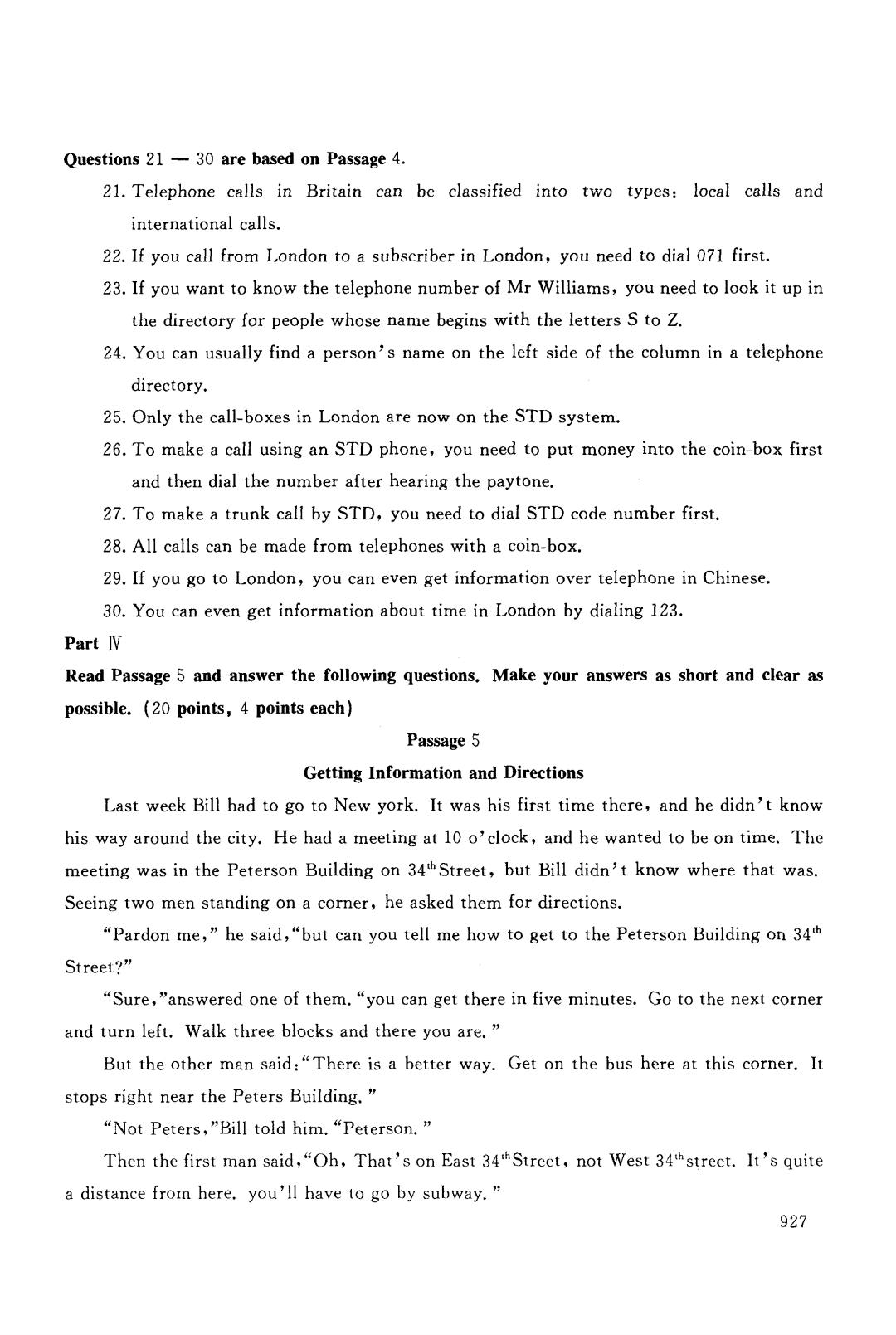
Questions 21-30 are based on Passage 4. 21.Telephone calls in Britain can be classified into two types:local calls and international calls. 22.If you call from London to a subscriber in London,you need to dial 071 first. 23.If you want to know the telephone number of Mr Williams,you need to look it up in the directory for people whose name begins with the letters S to Z. 24.You can usually find a person's name on the left side of the column in a telephone directory. 25.Only the call-boxes in London are now on the STD system. 26.To make a call using an STD phone,you need to put money into the coin-box first and then dial the number after hearing the paytone. 27.To make a trunk call by STD,you need to dial STD code number first. 28.All calls can be made from telephones with a coin-box. 29.If you go to London,you can even get information over telephone in Chinese. 30.You can even get information about time in London by dialing 123. Part IV Read Passage 5 and answer the following questions.Make your answers as short and clear as possible.(20 points,4 points each) Passage 5 Getting Information and Directions Last week Bill had to go to New york.It was his first time there,and he didn't know his way around the city.He had a meeting at 10 o'clock,and he wanted to be on time.The meeting was in the Peterson Building on 34 h Street,but Bill didn't know where that was. Seeing two men standing on a corner,he asked them for directions. "Pardon me,"he said,"but can you tell me how to get to the Peterson Building on 34th Street?” "Sure,"answered one of them."you can get there in five minutes.Go to the next corner and turn left.Walk three blocks and there you are. But the other man said:"There is a better way.Get on the bus here at this corner.It stops right near the Peters Building. “Not Peters,.”Bill told him.“Peterson.” Then the first man said,"Oh,That's on East 34 hStreet,not West 34 h street.It's quite a distance from here.you'll have to go by subway. 927
Questions 21 - 30 are based on Passage 4. 21. Telephone calls in Britain can be classified into two types: local calls and international calls. 22. If you call from London to a subscriber in London , you need to dial 071 first. 23. If you want to know the telephone number of Mr Williams, you need to look it up in the directory for people whose name begins with the letters S to Z. 24. You can usually find a person' s name on the left side of the column in a telephone directory. 25. Only the call-boxes in London are now on the STD system. 26. To make a call using an STD phone , you need to put money into the coin-box first and then dial the number after hearing the paytone. 27. To make a trunk call by STD, you need to dial STO code number first. 28. All calls can be made from telephones with a coin-box. 29. If you go to London , you can even get information over telephone in Chinese. 30. You can even get information about time in London by dialing 123. Part Read Passage 5 and answer the following questions. Make your answers as short and clear possible. (20 points, 4 points each) Passage 5 Getting Information and Directions Last week Bill had to go to New york. It was his first time there , and he didn't know his way around the city. He had a meeting at 10 0' clock , and he wanted to be on time. The meeting was in the Peterson Building on 34th Street , but Bill didn' t know where that was. Seeing two men standing on a corner, he asked them for directions. "Pardon me ," he said ,"but can you tell me how to get to the Peterson Building on 34th Street?" "Sure 飞nswered one of them. "you can get there in five minutes. Go to the next corner and turn left. Walk three blocks and there you are. " But the other man said:" There is a better way. Get on the bus here at this corner. It stops right near the Peters Building. " "Not Petersf'Bill told him."Peterson-" Then the first man said ,"Oh, That's on East 34thStreet , not West 34thstreet. It's quite a distance from here. you' 11 have to go by subway. " 927
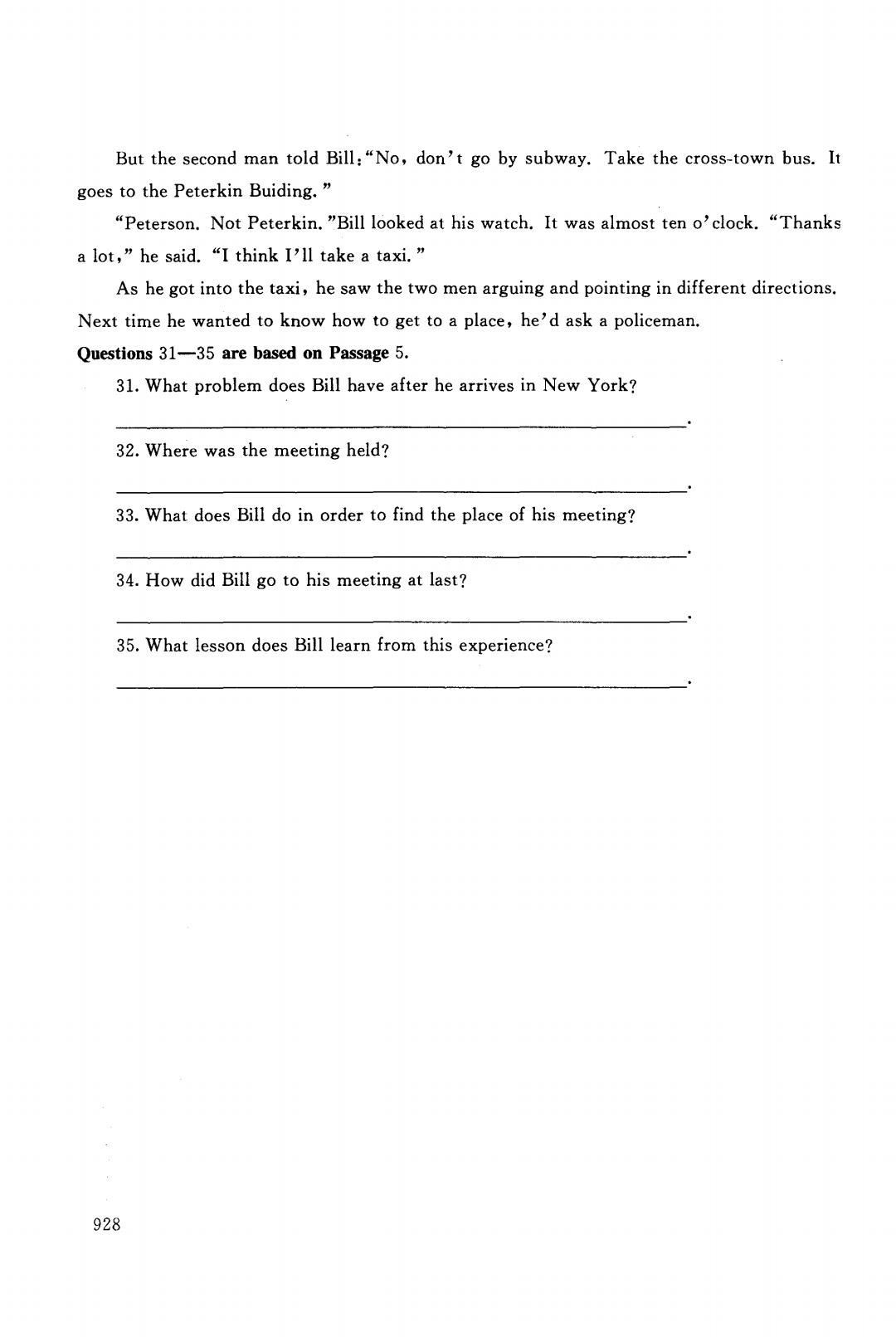
But the second man told Bill:"No,don't go by subway.Take the cross-town bus.It goes to the Peterkin Buiding." "Peterson.Not Peterkin."Bill looked at his watch.It was almost ten o'clock."Thanks alot,”he said.“I think I'll take a taxi.” As he got into the taxi,he saw the two men arguing and pointing in different directions. Next time he wanted to know how to get to a place,he'd ask a policeman. Questions 31-35 are based on Passage 5. 31.What problem does Bill have after he arrives in New York? 32.Where was the meeting held? 33.What does Bill do in order to find the place of his meeting? 34.How did Bill go to his meeting at last? 35.What lesson does Bill learn from this experience? 928
But the second man told Bi11:"No , don't go by subway. Take the cross-town bus. It goes to the Peterkin Buiding. " "Peterson. Not Peterkin. "Bi11100ked at his watch. It was almost ten 0' clock. "Thanks a lot ," he said. "I think I' 11 take a taxi. " As he got into the taxi , he saw the two men arguing and pointing in different directions. Next time he wanted to know how to get to a place , he' d ask a policeman. Questions 31一35 are based on Passage 5. 31. What problem does Bill have after he arrives in New York? • 32. Where was the meeting held? • 33. What does Bill do in order to find the place of his meeting? • 34. How did Bill go to his meeting at last? • 35. What lesson does Bill learn from this experience? • 928

试卷代号:2155 座位号■ 中央广播电视大学2009一2010学年度第二学期“开放专科”期末考试 英语阅读(1)试题答题纸 2010年7月 题 号 Part I PartⅡ PartⅢ Part N 总分 分 数 得分 评卷人 Part I (30 points,3 points each) 1. 2. 3. 4. 5. 6. 7. 8. 9. 10. 得 分 评卷人 Part II(30 points,3 points each) 11. 12. 13. 14. 15. 16. 17. 18. 19. 20. 得分 评卷人 Part III(20 points,2 points each) 21. 22. 23. 24. 25. 26. 27. 28. 29. 30. 929
试卷代号 5 5 座位号 中央广播电视大学 2010 学期 开放专 期未 英语阅读( 1)试题答题纸 2010 年7 Part I Part II Part ill Part 得分|评卷人 Part I (30 points, 3 points each) ••••• 2. 4. 6. 8. 10. 得分 l评卷人 Part II (30 points, 3 points each) 11. 16. 12. 17. 13. 18. 14. 19. 15. 20. 得分!评卷人 Part points, 2 points each) 21. 26. 22. 27. 23. 28. 24. 29. 25. 30. 929

得 分 评卷人 Part IV (20 points,4 points each) 31. 32. 33. 34. 35. 930
得分|评卷入 31. 32. 33. 34. 35. 930 Part N (20 points, 4 points each)